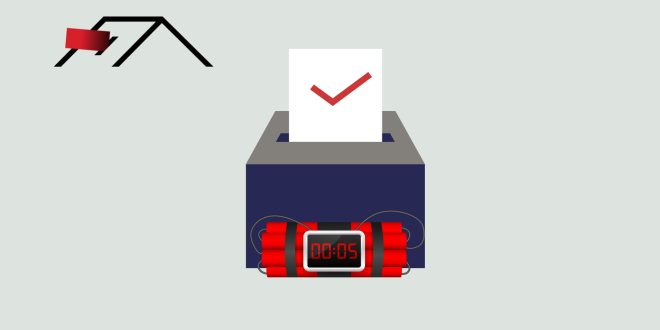The Varieties of Democracy (V-Dem) in its “Democracy Report 2023” has reported that 43% of the world’s current population is living in countries experiencing a decline in democracy, including Indonesia. The basis for this decline includes a decrease in freedom of expression, an increase in government censorship of the media, repression of civil society, and a deterioration in the quality of elections.
“In the past, Indonesia’s democracy index was supported by elections, especially in terms of election management and the conduct of the process. These two aspects typically overshadowed the decline in democracy in Indonesia. So, while the color of our democracy should be red, through the governance of elections, it turns somewhat yellow,” an academic from the Faculty of Law at the University of Indonesia, Titi Anggraini explained the Electoral Democracy Index (Indeks Demokrasi Elektoral or IDE), at the Auditorium Juwono Sudarsono Building, UI, Depok, West Java (12/5).
From the electoral democracy instrument, Indonesia’s IDE score indicates a decline of up to 16% in the last 10 years. The most significant decrease occurred in 2021, experiencing a decline of 4.4% compared to the previous year. Based on its indicators, over the last 10 years, clean elections have seen the highest decrease in the index score, reaching up to 14.1%.
Titi evaluated that the elections, which used to serve as a neutralizer for Indonesia’s democracy in global measurements, are currently facing serious threats. This is because, throughout the 2024 Elections, there have been numerous instances of fraud and manipulation conducted by election organizers, ranging from the registration and verification of participating political parties to the affirmation of women’s representation in the legislative process.
“The sweet promises regarding the 2024 Elections procedurally should be better and more stable because the Election Law has not changed. The good practices in the 2019 elections should not have been tampered with, as what was promised was stability, but the reality did not turn out that way,” she said.
According to her, the General Election Commission (Komisi Pemilihan Umum or KPU) currently serves the House of Representatives (Dewan Perwakilan Rakyat or DPR) more than the public. This is evident from the extensive involvement of political parties in the DPR in determining policies related to elections. Titi emphasized that if the election organizers were truly of integrity, half of the desire to achieve an election with integrity would already be realized.
“Because if the rules of the game are not good, but the organizers have integrity, with innovation, breakthroughs, and a commitment to democracy, it can result in more adaptive rules. But if there is no integrity, even good rules are the same, they have no meaning,” she added.
In addition, Titi also highlighted the Election Supervisory Body (Badan Pengawas Pemilu or Bawaslu), which she believes compromises too much with election participants regarding campaign activities. According to her, amidst technological advancements and the development of campaign creativity, Bawaslu should set clear boundaries regarding campaign violations.
“Because the permissive nature of political activities during the campaign period makes it difficult to hold illegal funds accountable, and that is very dangerous,” Titi concluded.
Meanwhile, Bivitri Susanti, an academic from the Indonesian Jentera Law School, explained that the practice of autocracy in Indonesia is easily accepted because the law, which should provide equal access for everyone, does not occur in Indonesia. This happens because democracy has intentionally been weakened by certain parties.
Bivitri mentioned that there are at least four institutions that have been weakened to undermine democracy. These include the Corruption Eradication Commission (Komisi Pemberantasan Korupsi or KPK) through the revision of the KPK Law, the DPR being rendered inactive in terms of oversight due to 82% of DPR members in the 2019-2024 period coming from the government coalition. Furthermore, restrictions on civil society’s freedom through the Information and Electronic Transactions Law (Informasi dan Transaksi Elektronik or ITE), and the Constitutional Court (Mahkamah Konstitusi or MK) through the replacement of Judge Aswanto, who was considered to have frequently annulled decisions made by the DPR.
“Alhamdulillah, today the changes to the Constitutional Court Law to remove judges who often disagree with the government and the DPR did not happen,” said Bivitri.
According to her, the hijacking of democracy through the constitution is also prevalent in other countries, such as Hungary and Venezuela. Both countries also employ a similar pattern, which involves disabling institutions that should oversee power and hijacking democracy through the constitution. This phenomenon occurs because in the law, everything can be concealed.
“Because behind the articles of regulations, everything becomes hidden. The law can be used as a tool to conceal abuses of power,” she emphasized.
According to the Freedom House report, Indonesia has a low score in political culture and civil liberties. Indonesia’s status has not improved beyond “partly free” since 2015, and it has even declined over the years.
The two aspects, which are also considered by Hurriyah, the Director of the Center for Political Science Studies at the University of Indonesia (Pusat Kajian Ilmu Politik Universitas Indonesia or Puskapol UI), as significantly hindering the improvement of our democracy’s quality. According to her, the erosion of democracy in Indonesia has occurred over a long period because those elected through democratic mechanisms often become the least democratic actors.
“That happens when democracy becomes a tool used by people who do not have a democratic perspective and do not make democracy their goal,” she said.
Therefore, according to her, the presence of opposition and the struggle of civil society must have a long-lasting spirit to safeguard democracy. In her view, the weakening of democracy occurs through three methods: stigmatization of opposition criticism, criminalization, and through legal, procedural, and formal means.
“So, the way we safeguard democracy is by strengthening civil society and creating new spaces. For example, using social media or through legal formalities, essentially equalizing the playing field,” added Hurriyah.
Additionally, in the context of elections, she also considers it important to involve youth in the election monitoring process. According to her, Generation Z is a generation accustomed to critical thinking and capable of distinguishing between true and false information. The problem, in her view, is that information about elections is not adequately available, which ultimately fails to reach youth.
“So, let’s fill our political discourse by using various social media to provide information to the youth. And let them be the ones who choose later,” she concluded.
AJID FUAD MUZAKI
Translated by Catherine Natalia
 Rumah Pemilu Indonesia Election Portal
Rumah Pemilu Indonesia Election Portal




